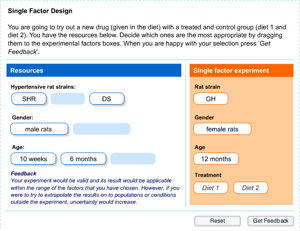Experimental Design
By Michael Festing and David Dewhurst. Software design: Douglas Bean
| Record number: | 64fb0 (legacy id: 5250) |
|---|---|
| Category: | Miscellaneous (NORINA) |
| Type: | Computer Program |

Experimental Design is a highly interactive computer based learning package to teach better experimental design.
It aims to help researchers, particularly those working with animals, to design more effective experiments which will deliver more information, produce more conclusive results, improve interpretation and reduce the number of experimental animals required. It combines real life scenarios, working examples and background theory and throughout the student learns by exploration and engages in interactive practical exercises that give hands on exposure to the key concepts in experimental design. The program has been designed with the close collaboration of research scientists in industry and academia. In addition, members of the scientific community ranging from post-graduates to project leaders have evaluated the software to ensure the appropriateness of its content.
The program aims to enable the research scientist to:
- Estimate the number of animals needed to attain the scientific objectives economically and effectively
- Select a suitable animal model
- Avoid bias and deal with variability
- Use appropriate statistical methods or more effectively consult professional statisticians
Sections can be accessed from a menu:
- Introduction & Aims - primes the user as to why experimental design is so critical. Engages the user with data from a simple experiment to highlight design flaws.
- Choice of Animal Model - explores the use different strains (inbred and outbred stock) and covers the various types of animal model (predictive, explanatory, exploratory).
- The Experimental Unit - uses interactive examples to explain the critical nature of the experimental unit and it's importance.
- Eliminating Bias - covers techniques you can employ to remove systematic differences between treatment groups and ensure your experiments are not biased. Again interactive examples are used
- Applying Valid Statistics - covers the application of valid statistical tests to your data, explores the definition of hypotheses, choices of statistical tests, and interpretation of P.
- Improving Precision - making experiments more precise so that we can detect treatment differences. Ways of achieving this - ensuring uniformity, use of blocking, using power analysis and the resource equation method.
- Increasing the Range of Applicability - using your resources effectively to enable you to interpret your findings over a wider range e.g. different treatments, different strains, sexes, sizes. Use of multi-factorial design.
- Planning and Organising - key issues in designing and analysing effective (simple) experiments.
- Self-Assessment Activity - series of case studies and true/false questions with feedback to self-assess your understanding.
- Software Tools & References - where to get further information.
Language: English
Recommended System Requirements: Safari 5.0 or later, Mozilla Firefox 4.0 or later, Google Chrome or Edge
Target Audience: This program is aimed at all research scientists using experimental animals, but the principles of experimental design are applicable to most areas of biological and medical research. Price: £250 (multiuser, educational license)
Takk for din tilbakemelding! Vær oppmerksom på at vi ikke kan kontakte deg hvis ikke du oppgir din epostadresse.
Hva lette du etter?
Gi oss gjerne en tilbakemelding slik at vi kan forbedre informasjonen på siden. På forhånd takk for hjelpen! Vennligst skriv inn din epostadresse hvis du vil ha et svar.
Kontakt oss gjerne på e-post hvis du har spørsmål.
